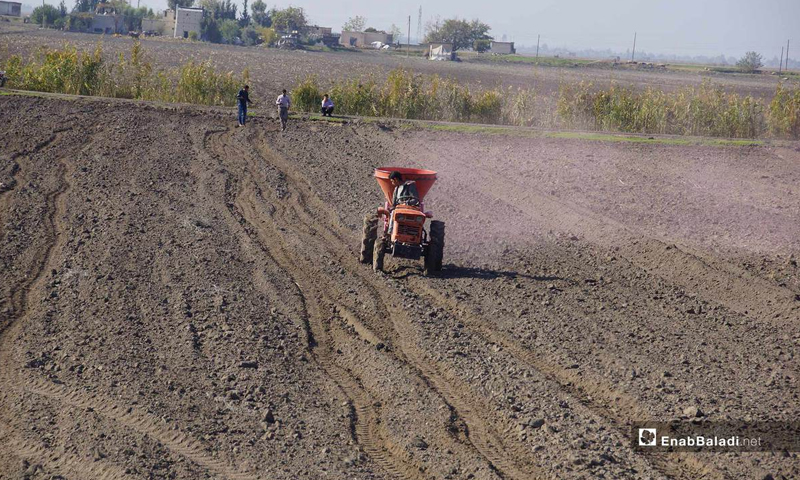



Northern Hama countryside – Iyad Abdul Jawad
In the hope of achieving a profit, like last year, Abdel Halim Bseis grew 85 dunums of the black cumin (Nigella sativa). But, unfortunately, he lost more than half of his crop, without knowing the reasons, leaving him with no options but to plow the black cumin crop and plant another in order to compensate for the major losses.
The black cumin is one of the Ghab Plain’s traditional crops. Ghab Plain residents used to cultivate their land with black cumin on a small scale. The crop was first grown in 1995 in the Ghab Plain, the head of Qastoun’s local council, Madin al-Hussien, told Enab Baladi.
He added that black cumin cultivation increased during the Syrian revolution. However, this year, farmers are suffering huge crop losses due to unknown reasons.
Cultivated lands have shrunk in the Ghab Plain since the Syrian regime advanced into its villages at the beginning of 2020. Only 22,000 dunams of lands remain under the control of the opposition, of which 3,200 are planted with black cumin, according to al-Hussein.
The head of the local council pointed out that the value of one dunam of black cumin planted in the Ghab Plain is 60 US dollars (USD), without harvest costs. Some farmers were forced to plow their lands in order to grow them with other summer crops as an alternative. Other farmers left their lands to be grazed by livestock herds.
Ali al-Ali, a farmer in Qastoun, planted a land area of two hundred dunams with black cumin. 75 dunums were damaged and given to livestock farmers, while the other part of his land remained unchanged. Al-Ali did not consider plowing and cultivating his land again because of the lack of irrigation water needed for summer crops, if any, planted. In addition, he cannot afford to draw water from the artesian wells.
The total cost of one dunum planted with black cumin, according to al-Ali, is 40 USD: 10 USD for the plowing, 10 USD for fertilizers and seeds, 15 USD for pesticides of all types, 5 USD for microbiome stimulants, and 20 US for the day laborers.
The head of Qastoun’s local council indicated that the reasons behind the damage of the growing black cumin crops are the increasing atmospheric humidity and delays in seasonal rains.
He added that the production of the black cumin crop in 2020 ranged between 250 and 300 kilograms per dunam, while in the current year, the production is estimated at one hundred kilograms per dunam.
The cultivation of black cumin requires “some special needs,” including the soil suitability and a moderate climate, the agricultural engineer Anas Abu Tarboush told Enab Baladi.
He highlights that moist soil of the-Ghab Plain, in which water collects after heavy rainfalls, causes multiple diseases to the crop. On the other hand, the black cumin needs suitable conditions for growing, such as a temperate dry climate, low levels of humidity, and certain types of soil, including sandy soils.
Abu Tarboush pointed out that the black cumin crop is one of the old crops in the world and modern in some areas. Before the eruption of the Syrian revolution, lands cultivated with black cumin were very few because the Syrian regime did not encourage the production of this crop in order not to increase its area at the expense of strategic crops, such as wheat, sugar beet, and cotton.
Black cumin crops generate high profits, mainly when exported, compared with other crops. With the outbreak of the revolution, the crops have been exported to the Gulf countries via crossings with Turkey. The price of the black cumin is linked with the value of the US dollar; the average productivity per hectare of black cumin is estimated at about a ton, and its price ranges between 2,500 and 2,900 USD.
if you think the article contain wrong information or you have additional details Send Correction